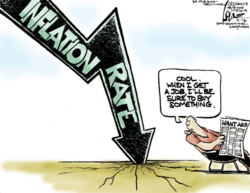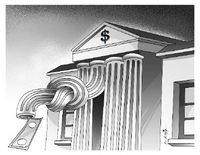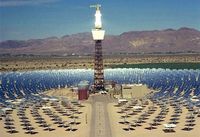Think of this as Volume 15, Number 15 of A-Clue.com, the online newsletter I've written since 1997. Enjoy.

There are two reasons why economic growth remains low, despite good policies which have staved off a second Great Depression:
- Money Remains Underemployed
- The New Game Hasn't Scaled Yet.
I have solutions for both problems today. Let's take them one at a time.
Money Remains Underemployed
There's plenty of capital around, but it is sitting in short-term storage. It's unemployed. Money managers say they're “preserving capital,” when what they should be doing is risking capital in hopes of a gain.
How do we bring that capital out and put it to work?
Inflation.

Money will go into investment. It will be lent in hopes of getting a better return. It will go into more speculative ventures with the same goal. This was FDR's aim with the New Deal. The big problem then was he didn't do enough of it.
Fact is if you let people park money at no cost and they're scared, they'll park it. Right now that fear is becoming irrational. The system is not collapsing, no matter what the bond vigilantes tell you.
They are, in fact, part of the problem. At the first sign of inflation the bond vigilantes start raising the price of government loans, putting more fear into the market.
How do you stop the bond vigilantes? Capital controls. Tell people, you can't take more than this amount of money out of the economy at any one time.

If parking your money in short term government instruments no longer preserves capital, and you can't take your money out of the economy entirely, you have to find a way to invest it in hopes of profit. You have to take a little risk. Your money becomes risk capital.
That's where growth comes from. It comes from risk capital. It comes from people using money to hire people and build things rather than just moving it around.
Rich people don't like to hear this, but they have a responsibility to use their money to do some good. Even if it's their money – even if they're not giving it away. They still have that responsibility. It's not a social or political responsibility, it's an economic one. Neither people nor money are any good sitting on their fat asses, doing nothing.
Make money go to work and growth will accelerate.

Every turn of the economic wheel is a new game. When the wheel begins to turn again, the old game no longer works.
We won't get growth from housing. We won't get growth from finance. That was the game of the last decade. That game ended with the Great Recession. It's over. Get used to it.
That's a hard lesson. I know because I had to learn it after the Dot-Bomb of 2000 ended the Internet Game. Growth might still be around. There were (and are) still niches to be discovered, rich new veins of money to be made online. But the idea of sticking your money in Internet stocks, and expecting to always win, was over. Any money that remained when the game ended disappeared. We needed a new game.
The nature of economic cycles, the kind we had from World War II onward, changed with the growth of inventory management technology in the early 1980s. Before that, production would rise above sales, goods would be stacked in warehouses, and the economy slowed until that inventory was worked off. There are no longer inventory recessions.
Instead they're economic events. They're caused by the game of the moment getting overdone. When everyone gets in there are no new suckers to buy. Markets collapse and we look for a new game. When everyone says buy, sell. When everyone says sell, buy.
So what's the new game?
The big problem of our time is also the big opportunity. It's a great game because, unlike the game of the last decade, or the one before that, this one represents real growth. It represents making stuff – not just solar panels or windmills or science, but real energy. Electricity to run our society. Hydrogen to run our cars.
It's the greatest economic opportunity of our time. We're moving from the present era of scarcity to one of abundance. We're going from acting as our cavemen ancestors did for thousands of years, looking for stuff to burn, toward finally civilizing as farmers, harvesting the energy all around us.
Once we realize that there is no energy shortage, that it's just a matter of creating enough devices to harvest the energy that is all around us, everything changes. All sorts of new opportunities open up, opportunities that will make our children's lives more rich and exciting than they can even imagine today, than we could ever imagine.
Trouble is, the real energy game hasn't scaled to absorb even the limited amount of capital going into it. I know this from the poor performance of solar stocks. They can't absorb the capital coming into them. They can't scale production and technology fast enough to absorb all that money right now.
It's a Moore's Law phenomenon.
Going from 1 to 2 gives you 1 more. Going from 1 billion to 2 billion gives you 1 billion more. The former is what's happening right now in alternative energy. The latter is what is happening in computing. But over the course of the next generation, that's also what is going to happen in alternative energy. You double things enough times and you start getting big numbers. And with alternative energy we can nearly double production just by making as many of whatever next year as we did this year. Make 30% more, as we are doing, and you assure doubling. Doubling and re-doubling.
And that assumes there is no new technology to increase efficiency or lower costs. That is coming. The figures I have given as estimates are, in my view, pessimistic ones.

The best use of government money right now lies in research, and in allowing the creation of larger markets. This is just what the federal government is doing. And it's what many states are doing.
This is a game that's going to represent explosive growth for a decade, so another thing we need to do is get young people excited about it. I know that in the mid-1970s my classmates and I had no idea we'd all wind up in the same industry, computing, but that's pretty much what happened. Well, today's college kids are going to wind up in alternative energy – a lot more than think that's possible.
What we need to do is preach abundance, teach abundance, and cover it with as much excitement as we possibly can. That's my contribution.
But scaling numbers takes time. What seems ridiculous right now will start to look a lot more real in two years, after we've doubled today's production to four times what is is. And more real in three, when we've taken it to eight. And so on.
The reason I have such confidence in the future is because I've seen this movie before, in computing. I also know, from covering computing since the early 1980s, all the wonders we have now, and how that abundance can accelerate other changes, building abundance rapidly in new directions.
I envy my kids. You should envy yours. And once you lift your personal depression, you'll be halfway home to ending the nation's.










Car crash injury claims account for more than half of all personal injury compensation claims made each year in Ireland. A recent insurance company survey showed that 80% of drivers consider the roads in Ireland are safe and that the standard of driving is improving, but Road Safety Authority statistics show a completely different picture.
Car crash injury claims account for more than half of all personal injury compensation claims made each year in Ireland. A recent insurance company survey showed that 80% of drivers consider the roads in Ireland are safe and that the standard of driving is improving, but Road Safety Authority statistics show a completely different picture.
ballon bleu de cartier
Dana Blankenhorn: Why the Economy Still Sucks (And Why It Won’t For Much Longer)
Nora
Dana Blankenhorn: Why the Economy Still Sucks (And Why It Won’t For Much Longer)